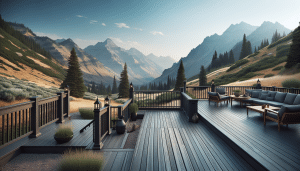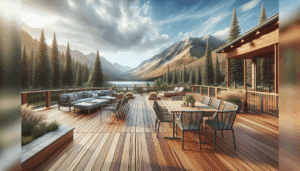Choosing a reliable wood deck builder feels a bit like dating: you want someone trustworthy, communicative, and capable of delivering something beautiful that lasts. You’re a homeowner in Orem, UT thinking about more summer barbecues, or maybe replacing an old, tired deck—so where do you start? This guide walks you through practical, down-to-earth steps to find a contractor who won’t ghost you mid-project and will build a deck you actually love.
Table of Contents
- Who this is for (and why it helps)
- Start with reputation — what really matters
- Licensing, insurance, and warranties — the boring but essential stuff
- Experience vs. fresh energy — yes, both can be good
- Ask about materials and design—be specific
- Permits, codes, and local quirks — don’t skip this
- Quotes, contracts, and timeline—how to compare fairly
- Communication and project management—small cues, big signals
- Red flags to watch for
- Local knowledge: why choosing a builder in Orem helps
- Final checklist — questions to ask before you sign
Who this is for (and why it helps)
This piece is for homeowners in Orem, UT and nearby who want to hire wood deck builders—people who care about looks, function, and long-term value. It helps by translating contractor-speak into plain English, flagging what matters, and giving you a checklist you can use when you meet builders or compare quotes. Think of it as your backyard bargaining power.
Start with reputation — what really matters
Reputation isn’t just star ratings. Look for real, recent projects near you. Photos are great, but you want to see a portfolio of finished jobs (not just staged pictures). Call former customers if you can—yes, actually call—and ask about timelines, cleanup, and whether the contractor returned to fix anything under warranty.
You can check online reviews, but don’t rely on one platform. Google, Yelp, Facebook, and Houzz often show different things. Pay attention to patterns: one-off complaints happen; repeated issues do not.
Licensing, insurance, and warranties — the boring but essential stuff
Here’s the thing: the prettiest salesperson doesn’t matter if the contractor lacks proper licensing or insurance. Ask for a current license number and verify it with the state. Make sure they carry general liability insurance and workers’ compensation. If someone says, “I don’t need that,” stop there. You don’t want to be liable if a worker gets hurt on your property.
Also, talk warranties. A solid deck builder stands behind their work with a clear warranty on labor and will explain manufacturer warranties on materials (for example, composite Decking brands like Trex or TimberTech have their own warranties).
Experience vs. fresh energy — yes, both can be good
Experienced builders know local codes, common pitfalls, and how to deal with Orem’s snow and sun. But don’t discount a newer company—sometimes they’re hungrier, more flexible, and focused on quality to build a reputation. The key is evidence: photos, references, and clear communication.
So don’t be fooled by “years in business” alone. Instead, weigh experience against demonstrable results.
Ask about materials and design—be specific
Materials change how a deck looks, how much maintenance it needs, and how long it lasts. Ask your builder these questions: What wood species do you recommend? How does it stand up to UV and moisture? Do you use corrosion-resistant fasteners? Which brands of composite boards do you install?
Deck materials matter. Pressure-treated lumber is common and cost-effective; it’s the basic workhorse. Composite decking resists rot and often needs less maintenance, though it can cost more up front and feel different underfoot. Cedar and redwood look great but need regular care. Honest answers here show craftsmanship.
Permits, codes, and local quirks — don’t skip this
Let me explain: Orem has local building codes and permit requirements. A reliable builder will handle permits and inspections, and they’ll explain timeline implications. If someone tells you permits aren’t necessary, that’s a red flag. You want a builder who knows the International Residential Code references and Simpson Strong-Tie connectors, and who plans for snow loads and Railing heights specific to Utah County.
Quotes, contracts, and timeline—how to compare fairly
Get at least three written quotes. Not because the cheapest is best, but because comparison reveals missing items. A low bid might exclude post footings, flashing, or necessary hardware. Ask each contractor to break their quote into materials, labor, and permits. That makes apples-to-apples comparisons possible.
What to insist on in the contract:
- Detailed scope: Clear description of work and materials.
- Payment schedule: Avoid large upfront deposits—spread payments to milestones.
- Start and end dates: Include allowances for weather but don’t leave the schedule vague.
- Change order process: How will extra work be approved and priced?
Communication and project management—small cues, big signals
How a company communicates before they’re hired often predicts how they’ll behave during the build. Are emails answered promptly? Do they return calls? Do they show up on time for estimates? These are small things but they matter. You don’t want to be surprised mid-project because the crew manager never returned a text.
You might also ask if they use construction management tools—simple stuff like shared schedules or photo updates. Some teams use apps such as Buildertrend or JobNimbus; that’s a plus if you like staying in the loop.
Red flags to watch for
Here are a few fast warnings: no insurance, cash-only deals with no contract, pressure to sign immediately, and vague answers about materials. Another one—if a contractor insists on a huge deposit and can’t provide references, walk away. Trust your instincts; if something feels off, it probably is.
Local knowledge: why choosing a builder in Orem helps
Local builders understand seasonal timing (you want foundation and framing before the first snow), sun orientation for staining choices, and how to deal with Utah’s wide temperature swings. They’ll also know which suppliers in Utah County are reliable—ProWood, local lumber yards, or authorized Trex dealers. That local network speeds projects and often reduces cost surprises.
Final checklist — questions to ask before you sign
Before you commit, ask these aloud (yes, out loud): Can I see recent job photos? Can I speak to two references from projects like mine? Do you handle permits? What’s your projected timeline? What brands do you use and why? How do you handle warranty claims?
Keep a written list of answers. Compare them across builders. That’s where clarity lives.
Ready to pick the right team for your deck? If you want a local partner who understands Orem weather, materials that hold up to sun and snow, and a straightforward process from permit to final stain, call Utah County Decks at 801-406-3726. You can also Request a Free Quote—we’ll come out, take measurements, show samples, and give you a clear, written proposal with options tailored to your home and budget. Let’s build a deck you’ll actually use and love.



